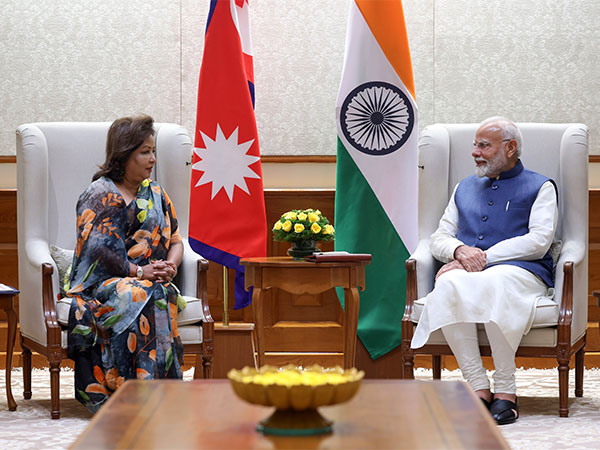KATHMANDU- Amid speculations about New Delhi’s response to Nepal’s new coalition government under KP Sharma Oli, a warm reception extended to Nepal’s Foreign Minister, Arzu Deuba Rana, by the Indian government in Delhi is being perceived as a positive gesture. This visit closely followed Indian Foreign Secretary Vikram Misri’s visit to Nepal, signaling India’s priority in maintaining strong ties with its neighbor. High-level exchanges like these are often seen as manifestations of friendly relations and a growing understanding between the parties involved. Foreign Minister Rana’s India visit underscores the commitment of both nations to strengthening their bilateral relationship.
India’s response to Foreign Minister Rana’s visit has been interpreted differently by various observers. While some have provided subjective analyses, others have attempted to uncover the strategic implications. Regardless, diplomatic interactions like this are open to multiple interpretations. However, those who are trying to narrate a bad story aiming to destabilize bilateral relations, should be overlooked. Conspirators are everywhere, they should be condemned.
This article aims to highlight Nepal-India relations, particularly in the context of recent high-level exchanges between the neighbors. It will focus on Kathmandu-New Delhi relations through the lens of KP Sharma Oli’s foreign policy and its approach to neighborly relations.
The importance given to Nepal’s Foreign Minister in India is a reflection of the importance given to the new government of Nepal formed under KP Sharma Oli. This gesture also honors the sentiments of the Nepali people. But the gestures should lead to some concrete action, for which we should wait for a few weeks (at least). Prime Minister Modi and his team are aware that Arzu Deuba Rana is the wife of former Prime Minister and a waiting Prime Minister Sher Bahadur Deuba. They also know that Arzu herself is a leader of the Nepali Congress. In that sense, Delhi’s response to her might have comprised such mixed posture. But, this time as a foreign minister of Nepal, she was perceived as a representative of the government of Nepal and, by extension, Prime Minister Oli. So, there’s a need to be cautious about possible efforts to create misunderstanding within the coalition by misinterpreting the visit.
During her meetings with Prime Minister Modi, Foreign Minister S Jaishankar, and other Indian officials, Minister Rana raised several key issues. These discussions covered bilateral relations, development cooperation and economic collaboration. It is important to note that this visit was not heavily loaded with agendas but rather aimed at setting a positive tone in bilateral relations at a time when Nepal’s new ruling coalition has just taken charge.
Minister Rana’s visit has set the tone for further discussions and future high-level visits. This diplomatic engagement also paved the way for an upcoming meeting between Nepal’s Prime Minister KP Sharma Oli and Indian Prime Minister Narendra Modi. Such interactions are expected to address and resolve longstanding issues, fostering trust and understanding between the two nations. It should be remembered here that Oli and Modi have been maintaining close contact and sharing thoughts on issues of mutual interest. During the visit, Minister Rana formally extended an invitation from Prime Minister Oli to Prime Minister Modi to visit Nepal, to which Modi responded positively, indicating that he will visit Nepal in appropriate time. This development is significant, marking the potential for reciprocal visits between the two leaders.
In building relations, the chemistry of the leaders and approach to the issues are also important. This is where the foreign policy approach of Prime Minister Oli comes in.
Prime Minister Oli’s foreign policy has been shaped by Nepal’s geographic location between its powerful neighbors, India and China. He has consistently prioritized maintaining a balanced and fair relationship with both countries on the basis of the principle of “sovereign equality.” His well-known assertion that “countries may vary in size, but all countries are equal in terms of sovereignty” encapsulates a core tenet of Nepal’s foreign policy and continues to guide the nation’s diplomatic engagements. This approach, in a way, aligns with India’s “Neighborhood First” policy and China’s “Peripheral Diplomacy,” both of which emphasize the importance of fostering good relations with neighboring countries.
Prime Minister Oli has emphasized that Nepal’s strategic location should be viewed as an opportunity for development rather than a challenge. He has also expressed appreciation for India’s leadership in global initiatives, such as campaigning of Global South, demonstrating the alignment of interests between the two nations. Throughout his previous tenures, Prime Minister Oli has remained committed to prioritizing Nepal’s national interest, navigating the complex geopolitical landscape with a focus on fairness and balance. In his fourth term as Prime Minister, Oli has, once again, openly requested both India and China to support Nepal’s development endeavors.
In conclusion, Prime Minister Oli’s foreign policy approach, centered on the principles of “amity with all” and “enmity with none,” aims to promote peaceful and cooperative relations with all nations. From the land of Gautam Buddha, Prime Minister Oli has called on the global community to embrace peace and non-violence as solutions to global crises. Nepal, with its rich heritage of peace, stands ready to contribute to global efforts in promoting harmony and understanding.
The recent visit of Nepal’s foreign minister to India should be analyzed by considering these factors.

